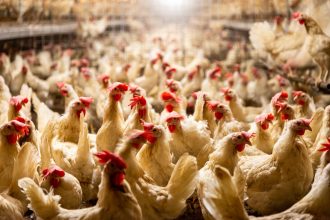Unlock the Editor’s Digest for free
Roula Khalaf, Editor of the FT, selects her favourite stories in this weekly newsletter.
The Scottish National party is forecast to lose more than three-quarters of its Westminster seats in the worst result for the pro-independence party since 2010.
The SNP is predicted by the Ipsos exit poll to win only 10 constituencies, down from the 48 it won in 2019, a result that would see Labour overtake it to become the largest party in Scotland as part of Sir Keir Starmer’s predicted national landslide.
Former SNP leader Nicola Sturgeon called the forecast result “seismic”, admitting it was “at the grimmer end of the expectations”.
She added: “This is not a good night for the SNP on those numbers.”
Under Sturgeon, the party moved into a dominant position in Scotland in 2015, a year after Scots voted to remain within the UK in the independence referendum.
But the party — in power in the Scottish parliament in Holyrood for 17 years — has been tarnished by a series of scandals, while polls suggested voters were disappointed with its record on issues such as healthcare, education and transport.
The exit poll predicts it will lose its status as the third-largest party in the House of Commons, something that will leave it with a lower profile. In recent years its leaders at Westminster have been able to use guaranteed airtime during prime minister’s questions to agitate on issues such as Brexit and the Gaza conflict.
The party, already facing a squeeze in donations, would also lose a proportion of its public funding if it slips down the ranking of parties in parliament.
The exit poll implied Labour would retake vast swaths of the populous Central Belt from Inverclyde, to the west of Glasgow, through the post-industrial heartlands of towns like Motherwell, to Edinburgh and beyond as far as East Lothian and Fife.
It also predicted that the Conservatives would double their seats to 12. The Tories, who are expected to report their worst UK-wide result in close to two centuries, won six seats at the last election in 2019.
One Conservative official described the poll as highly unrealistic, with those six battleground seats against the SNP being “very tight”.
The large Labour majority in Scotland deals a blow for the nationalist cause. During the campaign, SNP leader John Swinney had said that winning most seats in Scotland in the general election would give him a mandate to open negotiations with the new government for another independence referendum.
Labour only won one seat in 2019 — Ian Murray in Edinburgh South, who is favourite to be appointed Scotland secretary in a potential Starmer government.
The turnaround in Labour’s fortunes north of the border under the leadership of Anas Sarwar has been augmented by an active campaign in Scotland, with several high-profile visits from Starmer and senior Labour figures who saw the foundation of their pathway to power originating in Scotland.
“Labour MPs will be powerful advocates for Scotland in positions across a Labour government — and I also want to start delivering for Scotland on day one in government,” Starmer said at an election rally in East Kilbride on the eve of the election.
One retired voter in Edinburgh who, like many independence-supporting Scots, switched to Labour this election, said: “I haven’t voted Labour since Harold Wilson when I was a student in London in 1964 . . . The SNP has been punished for its record.”
Read the full article here




